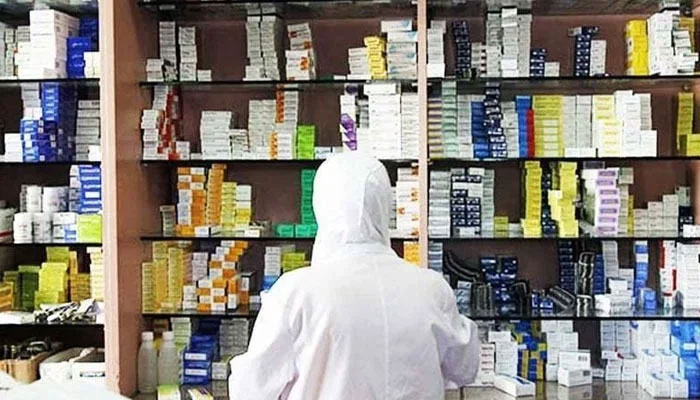Pharma industry seeks urgent price hike for 262 drugs amid rising costs
The Pakistan Pharmaceutical Manufacturers’ Association (PPMA) said the cost of producing medicines had risen sharply due to the depreciation of the rupee, inflation, and higher utility and raw material prices.
"The revision in prices of these medicines had become highly essential as the last time such an increase had been allowed by the government the value of the dollar was less than Rs 200," PPMA chairman Mian Khalid Misbah-ur-Rehman said at a press conference in Karachi. “In addition to the phenomenal increase in the dollar exchange rate, the production cost of medicines has increased manifold due to record inflation.”
Rehman warned that more multinational drug producers would be left with no option but to wind up their businesses if the government unnecessarily kept on delaying the decision to allow an increase in the prices of medicines whose hardship cases had been pending with the authorities for long.
“The number of multinational pharmaceutical companies in Pakistan has already significantly decreased over the past many years as any further reduction in their number will go against the current efforts of the government to attract foreign investment to Pakistan,” he said.
Rehman said over 100 essential drugs were already unavailable in the market as any further increase in the number of missing medicines would be a serious disservice to the patients in the country.
“The patients in such a scenario rely on spurious and smuggled drugs when the locally produced medicines aren’t available in the market.”
He said that the sustainability of the local pharmaceutical industry, which had been meeting up to 95 percent demand for medicines in the country, would be seriously threatened if the government didn’t review its drug pricing system.
“We have been constantly calling upon the government to pay heed to the ground realities affecting the drug producers in the country as the long-pending hardship cases of medicines should be expeditiously disposed of as per the law,” said the PPMA chairman.
He said the drug producers like any other industry in the country had been facing the serious challenge of constant increases in the cost of doing business due to phenomenal hikes in electricity, gas, labour, and raw material rates.
“The Pakistani medicine producers couldn’t produce any more medicine whose maximum retail cost has been frozen for the past over two years.”
Rehman said the pricing system should effectively work in the case of the local pharmaceutical industry as up to 95 percent of raw materials of the medicines were imported whose prices increased with the devaluation of the rupee.
He said that annual pharmaceutical exports of Pakistan stood at around merely $300 million as it could be increased to $5 billion but for this, the government should consistently implement favourable policies for the drug industry allowing it to adopt state-of-the-art production technologies.
-
 Panthers Vs Islanders: Dmitry Kulikov Returns From Injured Reserve As Schwindt Hits IR
Panthers Vs Islanders: Dmitry Kulikov Returns From Injured Reserve As Schwindt Hits IR -
 SAG-AFTRA Drops SAG Awards Name To Rebrand
SAG-AFTRA Drops SAG Awards Name To Rebrand -
 Next Full Moon: How To Watch The Total Lunar Eclipse On March 3
Next Full Moon: How To Watch The Total Lunar Eclipse On March 3 -
 Bhad Bhabie Shares Tender Moment With Daughter Amid Cancer Setback Hint
Bhad Bhabie Shares Tender Moment With Daughter Amid Cancer Setback Hint -
 Silver, Gold Prices Surge Amid Geopolitical Uncertainty After US-Israel Attack On Iran
Silver, Gold Prices Surge Amid Geopolitical Uncertainty After US-Israel Attack On Iran -
 Britain To Trial Social Media Ban For Hundreds Of Thousands Of Children Under-16
Britain To Trial Social Media Ban For Hundreds Of Thousands Of Children Under-16 -
 Prince Harry Should Face Same Fate As Shamed Andrew, Says Expert
Prince Harry Should Face Same Fate As Shamed Andrew, Says Expert -
 Oil Price Jumps, Stocks Fall After US And Israel Strike Iran
Oil Price Jumps, Stocks Fall After US And Israel Strike Iran -
 Demi Lovato Admits Younger Self 'would Never Believe' Her Life Now: 'It Can Get Better'
Demi Lovato Admits Younger Self 'would Never Believe' Her Life Now: 'It Can Get Better' -
 Gunman Identified After Texas Bar Shooting Leaves 3 Dead, 14 Injured
Gunman Identified After Texas Bar Shooting Leaves 3 Dead, 14 Injured -
 Meghan Markle Was Bad Mouthed By Royals On King Charles Coronation
Meghan Markle Was Bad Mouthed By Royals On King Charles Coronation -
 'Bridgerton' Season 4: Showrunner Talks About Violet's Steamy Romance
'Bridgerton' Season 4: Showrunner Talks About Violet's Steamy Romance -
 John Tesh Recalls ‘uncomfortable’ Backlash Over ’70s Romance With Oprah Winfrey
John Tesh Recalls ‘uncomfortable’ Backlash Over ’70s Romance With Oprah Winfrey -
 Meghan Markle, Prince Harry Problem Was Not ‘work’ During Time With Royals
Meghan Markle, Prince Harry Problem Was Not ‘work’ During Time With Royals -
 Meta Strikes Multi-billion-dollar AI Chip Deal With Google: Will The New Collaboration Pay Off?
Meta Strikes Multi-billion-dollar AI Chip Deal With Google: Will The New Collaboration Pay Off? -
 Gracie Abrams Breaks Silence After Losing 2026 BRIT Award
Gracie Abrams Breaks Silence After Losing 2026 BRIT Award




